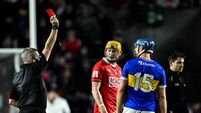Tapes, telephony and television — how they are entwined on this isle
Then maybe we’ll all finally understand who said what and to whom, and what happened as a consequence of all that. Or, just possibly, the Commission of Enquiry might get to the bottom of it all first.
Although he may not be a household name, there are few figures among the Irish judiciary with greater authority than Niall Fennelly. He has been a distinguished member of the Supreme Court for thirteen years or so, and before that one of the best-known senior counsels in the country. Most people who know him would have a lot of confidence that by appointing him to conduct the Commission of Enquiry into the Garda taping controversy, the Government (whether it wants to or not!), is ensuring that we’ll all know the truth in the end.















